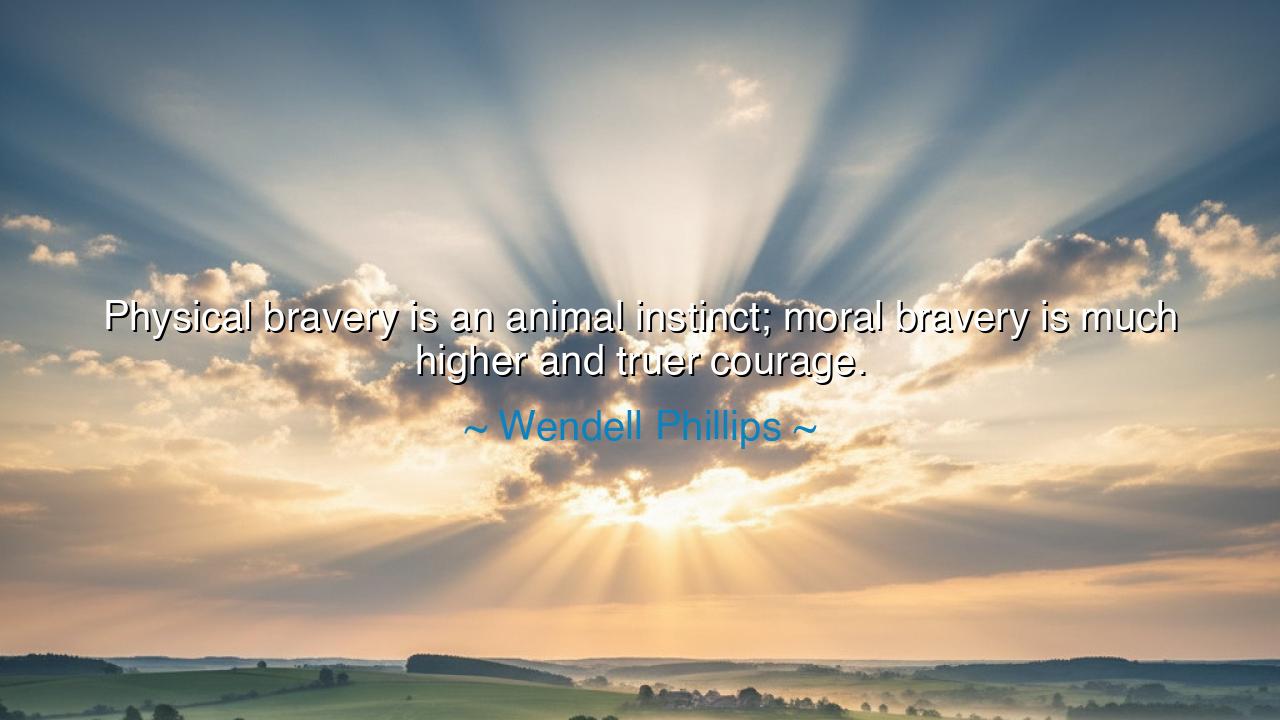
Physical bravery is an animal instinct; moral bravery is much
Physical bravery is an animal instinct; moral bravery is much higher and truer courage.






“Physical bravery is an animal instinct; moral bravery is much higher and truer courage.” – Wendell Phillips
In these words, Wendell Phillips, the fiery orator and defender of justice in 19th-century America, reveals a truth that pierces through all ages — that true courage does not lie in the strength of the arm, but in the strength of the soul. He distinguishes between two kinds of bravery: physical bravery, which springs from instinct, and moral bravery, which arises from conscience. The first belongs to the realm of the body — the reflex that drives a soldier to charge, a man to fight, an animal to defend its life. But the second, moral bravery, is born of something higher: it is the courage to stand alone for what is right, to defy the crowd, to face not death, but disgrace, rejection, or persecution — and yet to remain unbroken.
The origin of this wisdom lies in the crucible of Phillips’s own life. A man of privilege and eloquence, he could have lived in ease and admiration. Yet when he heard of William Lloyd Garrison, the abolitionist who was attacked for denouncing slavery, Phillips stood before the world and declared his allegiance to truth. From that moment, he became a voice for freedom, enduring mockery, hatred, and threats of violence. His was not the courage of the battlefield, but of the conscience — the courage to speak when silence would have been safer. In his words, we hear the echo of his own defiance, his faith that moral courage — the courage to act justly against injustice — is the highest form of heroism.
Physical bravery, as Phillips says, belongs even to the beasts. The lion defends its cubs, the wolf fights to the death for its pack — their courage is instinctive, noble but natural. It is the same spark that drives a soldier into fire or a rescuer into danger. Yet it does not require reflection or principle; it answers the call of nature. Moral bravery, however, is born of reason and spirit — it is a decision, not a reflex. It demands that a man resist not an enemy’s sword, but his own fear of isolation. It asks him to battle not for survival, but for truth. It is the courage of the martyr who faces death rather than betray his faith, the reformer who stands firm though the world mocks him, the thinker who speaks the truth though it may cost him everything.
Consider Socrates, who drank the hemlock rather than recant his teachings. The Athenians condemned him, yet he met death calmly, believing that truth must be obeyed even above life itself. His bravery was not physical — he did not fight or flee — but moral, born from an unshakable integrity. Or think of Rosa Parks, who refused to surrender her seat on a segregated bus. Her act was quiet, but it changed a nation. She possessed no weapon, no army, yet her defiance struck more deeply than any blade. Such examples show that moral courage requires a strength rarer and more enduring than any physical feat — for it demands that one conquer fear not of pain or death, but of condemnation, loneliness, and loss.
Moral bravery, then, is not loud; it does not roar upon the battlefield. It stands quietly in the courtroom, the pulpit, the marketplace, the home — wherever truth must be spoken and injustice resisted. It is the mother who protects her child from corruption, the teacher who defends knowledge from ignorance, the citizen who speaks out against tyranny though his neighbors turn away. To act thus is to join the lineage of the righteous, those who stand as pillars between darkness and light. It is easier to fight an enemy you can see; harder to resist the invisible chains of fear, comfort, and conformity. Yet the latter is the truer test of courage.
Phillips’s words call us to awaken that higher bravery within ourselves. For every age has its evils, and every man and woman faces moments when silence becomes complicity. To be morally brave is to listen to conscience when all others turn away, to defend truth even when it costs reputation, peace, or safety. It is not always grand or public; sometimes it is simply refusing to lie, refusing to hate, refusing to yield to what we know is wrong. The world has been changed not only by warriors, but by those who had the courage to speak, to write, to endure.
So, my children, let this be your lesson: cultivate not only the courage of the body, but the courage of the soul. The first may win you glory, but the second will win you honor. Physical strength fades with age, but moral strength grows with every act of integrity. Be willing to stand alone if truth demands it; be ready to suffer for what is right rather than prosper for what is wrong. Remember that every time you choose honesty over convenience, compassion over cruelty, justice over comfort, you are practicing the highest form of courage.
For as Wendell Phillips teaches, true bravery is not in the heart that fears no pain, but in the soul that fears no truth. The body’s valor may win battles — but the courage of conscience, the moral bravery that resists evil in all its forms, is what wins the eternal war for the human spirit.






AAdministratorAdministrator
Welcome, honored guests. Please leave a comment, we will respond soon